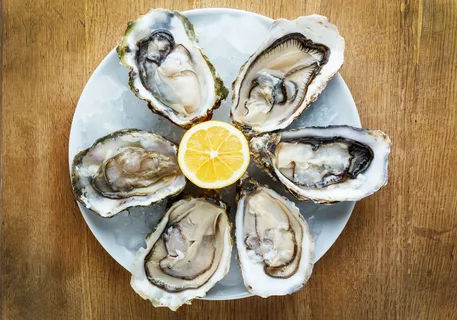Introduction
Oysters are a type of shellfish that are beloved by seafood enthusiasts for their unique taste and texture. They are not only delicious but also packed with essential nutrients, making them a popular choice for those looking to boost their overall health. In this comprehensive guide, we will explore the nutrition profile of oysters, potential risks associated with their consumption, and various methods for cooking and enjoying them.
Understanding Oysters
What are Oysters?
Oysters are bivalve mollusks that live in marine or brackish habitats, such as estuaries and coastal waters. They have two hinged shells that protect their soft, edible body inside. Oysters are filter feeders, meaning they extract plankton and other nutrients from the water to feed themselves.
Types of Oysters
There are many species of oysters, but some of the most commonly consumed varieties include:
- Eastern Oysters (Crassostrea virginica)
- Pacific Oysters (Crassostrea gigas)
- Kumamoto Oysters (Crassostrea sikamea)
- European Flat Oysters (Ostrea edulis)
Nutrition Profile of Oysters
Oysters are nutrient powerhouses, packed with essential vitamins, minerals, and other beneficial compounds. Here is a breakdown of their nutritional content:
Protein
Oysters are an excellent source of high-quality protein, containing all essential amino acids needed for muscle repair and growth.
Omega-3 Fatty Acids
They are rich in omega-3 fatty acids, particularly EPA and DHA, which are essential for heart health and brain function.
Vitamins
Oysters are loaded with vitamins, including vitamin A, vitamin D, vitamin B12, vitamin C, and vitamin E.
Minerals
They are particularly high in minerals like zinc, iron, selenium, copper, and magnesium, all of which play vital roles in various bodily functions.
Health Benefits of Oysters
Heart Health
The omega-3 fatty acids found in oysters can help lower blood pressure, reduce inflammation, and improve overall cardiovascular health.
Immune Support
Oysters are rich in zinc, a mineral that plays a crucial role in immune function. Adequate zinc intake is essential for maintaining a healthy immune system and protecting against infections.
Brain Function
The omega-3 fatty acids in oysters, particularly DHA, are essential for brain health and cognitive function. Regular consumption of oysters may help improve memory and concentration.
Bone Health
Oysters are a good source of calcium, magnesium, and vitamin D, all of which are important for maintaining strong and healthy bones.Skin Health
The vitamins and minerals found in oysters, including vitamin E and zinc, can help promote healthy skin, reduce inflammation, and protect against oxidative damage.
Potential Risks Associated with Oysters
Foodborne Illness
Consuming raw or undercooked oysters can increase the risk of foodborne illnesses, such as norovirus, Vibrio vulnificus, and bacterial contamination.
Heavy Metal Contamination
Oysters are filter feeders, which means they can accumulate heavy metals and other pollutants present in the water. Regular consumption of contaminated oysters may lead to heavy metal toxicity.
Allergic Reactions
Some individuals may be allergic to shellfish, including oysters. Allergic reactions can range from mild itching and hives to severe anaphylaxis, which requires immediate medical attention.
How to Cook and Enjoy Oysters
Raw Oysters on the Half Shell
Serve raw oysters on a bed of crushed ice with lemon wedges and your choice of condiments, such as cocktail sauce, mignonette, or hot sauce.
Oysters Rockefeller
Top raw oysters with a mixture of spinach, butter, breadcrumbs, herbs, and cheese, then bake until golden and bubbly.
Grilled Oysters
Place oysters on a hot grill, shell-side down, until they begin to open. Remove the top shell, add a dollop of garlic herb butter, and continue grilling until cooked through.
Fried Oysters
Dredge shucked oysters in seasoned flour or breadcrumbs, then fry in hot oil until golden brown and crispy. Serve with tartar sauce or aioli for dipping.
Oyster Stew
Simmer shucked oysters in a creamy broth with vegetables, herbs, and spices for a comforting and flavorful stew.
FAQs
Are raw oysters safe to eat?
Raw oysters can pose a risk of foodborne illness, so it’s essential to consume them from reputable sources and ensure they are properly handled and stored.
Can you eat oysters while pregnant?
Pregnant women should avoid eating raw oysters due to the risk of foodborne illness. Cooked oysters are generally safe to eat during pregnancy when cooked thoroughly.
How should oysters be stored?
Store live oysters in the refrigerator in a breathable container, such as a mesh bag, and consume them within a few days of purchase. Shucked oysters should be stored in a sealed container and consumed within 1-2 days.
What is the best way to shuck an oyster?
To shuck an oyster, insert an oyster knife into the hinge of the shell and twist until it pops open. Then, run the knife along the inside of the shell to loosen the oyster from the shell.
Are oysters high in cholesterol?
Oysters are relatively low in cholesterol compared to other animal proteins. They are also high in omega-3 fatty acids, which can help reduce cholesterol levels.
Can you freeze oysters?
While oysters can be frozen, their texture may change when thawed, so it’s best to consume them fresh whenever possible.
Are there any alternatives to raw oysters for enjoying their benefits?
Yes, cooked oysters are a safe and delicious alternative to raw oysters and can be prepared in various ways, as mentioned earlier.
Conclusion
Oysters are not only delicious but also incredibly nutritious, providing a wide range of vitamins, minerals, and other beneficial compounds. However, it’s essential to consume them safely and be aware of potential risks associated with their consumption. By following proper handling and cooking techniques, you can enjoy the health benefits of oysters while minimizing the risks. Whether enjoyed raw on the half shell or cooked in a flavorful dish, oysters are a versatile and nutritious addition to any diet.
- Xela Rederm Skin Booster Treatments Near Albury, Surrey - June 1, 2025
- Jaw Fillers For A Defined Jawline Near Merton, Surrey - May 31, 2025
- Retinol Peel Near Croydon, Surrey - May 31, 2025

